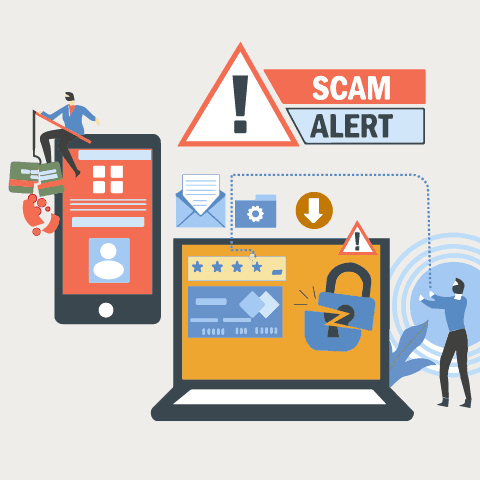
Preventing Elder Financial Abuse
Tips from the US Department of Justice
According to the Bureau of Justice Statistics National Crime Victimization Survey, in 2014, 2.6 million persons over age 65 were victims of identity theft.
- Over 13% of older Americans are a victim of financial fraud yearly
- Only 1 in 44 cases of Financial Abuse is reported
- Seniors with cognitive incapacity suffer greater economic loss
Why are older adults targeted?
- That’s where the money is!
- If retired, they are often at home and accessible
- Older adults with memory problems are a particularly attractive target
- Older adults may be more trusting
How does financial abuse occur?
Through The Mail/Mass Mailings
- Mail Scams
- “You have won the lottery”
- “You have won a prize”
- “You may receive a check”
- “You have won money”
- Fake charities asking for money
- Free lunch investment seminars
- Psychic scams
On the Computer
- Phishing scams – official-looking emails, ads, or pop-up messages designed to trick you into clicking them. DO NOT CLICK these emails!
- They may install a virus on your computer or take you to a false website to capture your personal data.
- Other online scams:
- Online dating or Facebook scams
- Work at home or investment scams
- Lottery Scams
Over the Phone
- IRS/Treasury Department scam calls – the IRS or Treasury Department will not contact you by phone if you are late or have not paid taxes. These are impostors!
- The Grandparent Scam – a fake call from a grandchild, nephew, niece etc. saying they are in trouble and need money
- Telemarketers – repetitive, high pressure calls sometimes with scare tactics
On TV or Radio
- Products with large shipping or handling charges
- Products sold that are frequently fake:
- Quick weight loss products
- Fraudulent mortgage ads
In Person
- Door-to-door repairs or sales
- Investment Fraud
- Guardian/Conservator or POA
- Family
- Lawyers
- Medical/caregivers
- Check Fraud
- Credit Card Fraud
Who are the financial abusers?
- Family, friends, neighbors or acquaintances
- Professionals, such as lawyers, doctors, financial advisors, clergy, caregivers, guardians, etc.
- Strangers such as a telemarketer or door to door sales or repair person, new love interest, TV or radio announcers
Signs of Financial Abuse to Look Out For
- Unpaid bills, a large amount of junk mail, sizable bank withdrawals or unusual credit card activity
- Caregiver/family not providing for the older adult
- Changes in personality, demeanor, hygiene, self-care
- Missing valuables
- Unusual new friends, new names on accounts
- Unusual changes in a will or beneficiary
- Phone ringing constantly
- Calls from debt collectors
- Social isolation, abuser “speaks” for the victim
- Strange charges on a medical bill
- Home in a state of disrepair
How to Avoid Financial Abuse
- Safeguard financial and personal information
- Order your credit report - Equifax, Experian, Transunion
- Use safe computer practices
- Hang up the phone
- Review all financial statements
- Check out any repair person you hire – get 3 estimates
- Don’t sign a contract until you have verified the company
- If you don’t understand a financial transaction or if you feel you are being pressured to give money, to sign a document – ask for help!
Get Involved, Prevent, Report
- Put a stop payment on money wires, checks
- Place a fraud alert with the 3 credit reporting companies
- Change your phone number
- Freeze credit, shred old credit cards
- Contact the bank, credit companies
- Call law enforcement and make a report
- Get a restraining order at court
- Call a crisis hotline
- Report to Adult Protective Services
- Call or report to appropriate government agency
- Seek legal counsel
- See EJI site for how to report at elderjustice.gov
If Fraud Happens, What Do I Do Next?
If you or a loved one have been a victim of fraud, here are places it can be reported:
- All Fraud can always be reported to Adult Protective Services in your area
- Through the mail, report to the The U.S. Postal Inspection Service (USPIS)
- Through the computer, report to Sentinel, FTC, FBI-Internet Crime Complaint Center (IC3) or USPIS
- On the phone, contact The Federal Trade Commission (FTC)
- On TV or radio, contact The Federal Trade Commission (FTC)
- In person, call your local police first
Other helpful reporting resources that can provide help and support:
- National Center for Victims of Crime (NVCV): https://victimsofcrime.org/ or Call Victim Connect: 1-855-484-2846
- The National Center on Elder Abuse: https://ncea.acl.gov/home#gsc.tab=0
- The U.S. Postal Inspection Service: https://postalinspectors.uspis.gov or 1-800-275-8777
- The Federal Trade Commission: https://www.ftc.gov/
- Free Credit Report: https://www.freecreditreport.com/
- The National Association of Adult Protective Services: www.napsa-now.org/ or 1-217-523-4431
- Better Business Bureau: https://www.bbb.org/all/scamtips
- AARP: www.aarp.org or 1-800-222-4444, option #2
- The U.S. Securities and Exchange Commission: www.sec.gov/ or 1-800-732-0330
- The Federal Bureau of Investigation: https://www.fbi.gov or 1-866-720-5721
- The Consumer Financial Protection Bureau: www.consumerfinance.gov/ or 1-855-411-2372
- Equifax: www.equifax.com or 1-888-766-0008
- TransUnion: www.transunion.com or 1-800-680-7289
- Experian: www.experian.com or 1-888-397-3742
Author
The information shared in this post is courtesy of the US Department of Justice: Elder Justice Initiative. The mission of the Elder Justice Initiative is to support and coordinate the Department’s enforcement and programmatic efforts to combat elder abuse, neglect and financial fraud and scams that target our nation’s older adults.
Blog
"I like that IMCC focuses on dementia-related problems and provides a focal point for families to network and socially interact in coping with dementia. It provides a community that helps us in our struggle."







